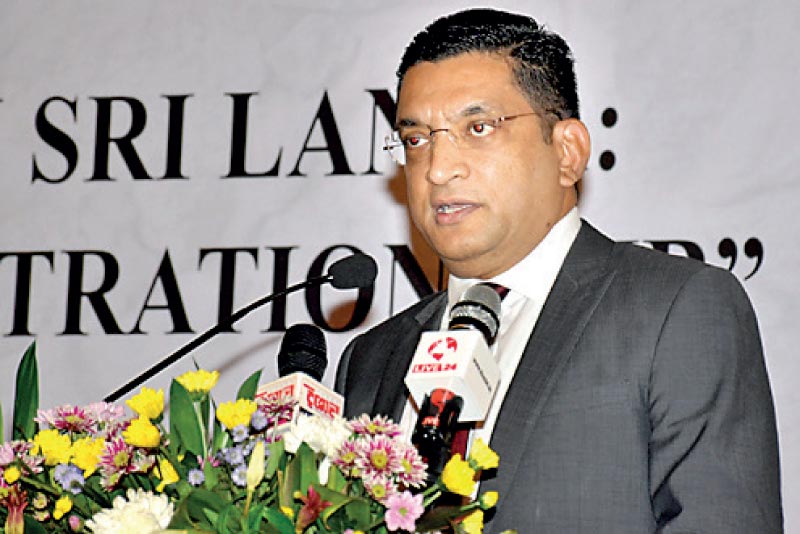Thursday Feb 19, 2026
Thursday Feb 19, 2026
Monday, 28 August 2023 03:49 - - {{hitsCtrl.values.hits}}

Foreign Minister M.U.M. Ali Sabry - Pic by Lasantha Kumara
By Divya Thotawatte
Foreign Minister Ali Sabry last week emphasised Sri Lanka has the potential to become an arbitration hub with its great foreign policy, the independent judiciary system and skilled lawyers and judges though the country will need to take time-bomb action towards efficiency and transparency.
Speaking at “Arbitration In Sri Lanka: Becoming An Arbitration Hub” organised by the SAARC Arbitration Council (SARCO) in collaboration with Federation of Chambers of Commerce & Industry of Sri Lanka (FCCISL) and Sri Lanka National Arbitration Centre (SLNAC), Sabry discussed Sri Lanka’s potential of becoming an arbitration hub which would create opportunities in moving forward as a country and a region.
“Why should Sri Lanka be an arbitration hub? It’s our foreign policy– we are friends of all and an enemy to none. Therefore, we welcome all our friends from the region and far with open arms to come and do business here. That is one of our greatest strengths over a period of time. Sri Lanka has refused to be drawn into any camp and we continue to respect that. That is an advantage for anybody to come and make themselves comfortable here.
We also have the independence of the judiciary and we have a vibrant judiciary.”
He added that Sri Lanka was growing in terms of connectivity in addition to the high standards of hospitality and the English-speaking levels of the country, which further contributed to Sri Lanka’s potential in handling international business affairs and arbitration. However, there is much to improve and if Sri Lanka is to become an arbitration hub, efficiency with regard to the process, time, and cost should be improved. Yet, it is the responsibility of many parties. It is the collective responsibility of lawyers, judges, arbitrators, administrators and institutions.
He explained that since arbitration is an alternative dispute resolution mechanism, investments made on the system are less in terms of the number of judges, number of courts, technology and digitalisation, and making timely moves to update the laws.
“If we are to break through as an arbitration hub, it cannot just be a hobby of lawyers to go to courts in the morning and come back in the afternoon. We need to change our attitude. Unless we are transparent and willing to discuss the pros and cons, we will never move ahead. Last year, we had a huge fall in our economy because we refused to tell the truth. There is no future without honesty. The discussions should be truthful, open and transparent.”
Unless there is time-bomb action taken, Sri Lanka will not make headway as a country or a destination, Sabry explained. The laws that he worked on when he was the Justice Minister were already coming to fruition now while creating major impacts. Therefore, significant change is possible, he said.
Due to the services delivered in the past, many parties seek international arbitration services in Sri Lanka, and improving in the area would create many opportunities for the country and the entire region as well.
“It is regions that develop together. For example, mainland China, which is a huge area, has developed and uplifted 850 million out of poverty. The United States is about 50 countries together as a federal structure, together with Canada having developed the entire region. SAARC also has great potential. There are a lot of opportunities among ourselves. Not to be prisoners of the past. It is time we sit and look ahead at the future.”
Sabry elaborated that where India is poised to be the world’s third biggest economy by 2028, it also provides a lot of opportunities for the entire region where the region could be developed as one unit, prospective to all. Similarly, the development of Sri Lanka also provides a great opportunity for the region.
However, in making Sri Lanka an arbitration hub, being realistic, a good understanding of the challenges, a focus and delivering on that is required. “It is possible. Last year when we underwent the economic crisis, no one gave a chance to Sri Lanka. It did not take long for us to come out of that state. But our economy is still only 0.2% of the economy of the entire world. Nobody is looking to grab our country. We need to be realistic and open and work towards integration, that is where the opportunity lies.”